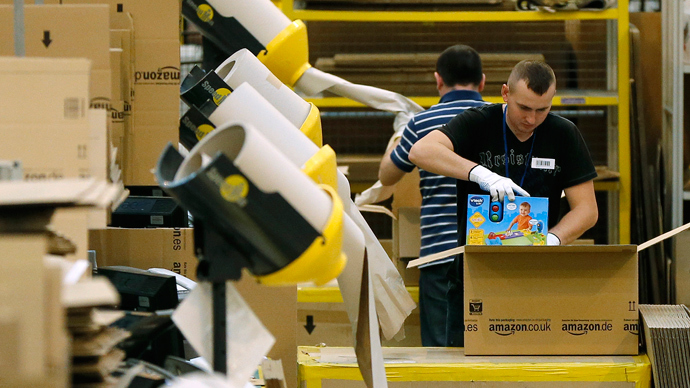Who really holds the key to Britain's 'invisible handcuffs'?

The latest menace to society was splashed across the London press this week: the scourge is “Modern Slavery,” and a new parliamentary bill has been drafted to put an end to it.
But this is not the debt slavery, hastened by the 2008 bailout that comes from our 30 million landless people's uphill struggle to earn a “living wage.”
No. This new slavery is conducted by “ruthless” individuals housing and feeding Britain's growing army of destitute citizens in exchange for labor. Home Secretary Teresa May triumphantly tells us the punishment for the modern slave-keeper will be “life imprisonment.”
Kind or cruel, the morality of employers that provide only food and accommodation depends entirely on their character: the quality of accommodation, how many hours “resident employees” have to work and how much, if any, cash they get. The sad contrast, lost on the Home Secretary, is that many normal wage paying employers treat their employees as expendable nobodies and pay barely enough to cover Britain's grossly inflated housing, transport, food and energy costs, leaving these “non-slave” workers with no disposable income at all.
Britain's establishment no strangers to slavery
To discover Britain's role in sponsoring slavery, ancient and modern, perhaps we should look at the ruthless grip on trade secured by English corporations of the past. Similar to the model of Germany's earlier Hanseatic League, England's Merchant Adventurers were a commercial alliance formed in 1407, soon controlling three-quarters of the nation's foreign trade.
By 1689, the monopolistic profit creaming of the Merchant Adventurers had become so parasitic to all forms of business that their Royal Charter was revoked, but all was not lost for the privileged merchant elite.
Anticipating this demise, many of the old Medieval Templar ports had established formal cartels and a Bristol-based corporation had been established in 1552 called the Merchant Venturers.
They took over where monopolists like the Merchant Adventurers had left off and became prime movers behind the infamous and highly profitable “triangular trade” in African slaves.
Arms and manufactured goods were shipped from Bristol to the West African colonial stations where black slaves were kidnapped by rival tribes, usually at gunpoint, chained, sold and shipped to the West Indies. From there molasses and other lucrative foodstuffs from the slave plantations were shipped back to Bristol and other European markets.
The “Middle Passage” was the one side of the triangle that did not touch Europe, so the Merchant Venturers' horrific human trade was kept quiet, one step removed from Bristol. Between 1600 and eventual abolition in 1807, scholars estimate around 15 million African slaves were trafficked in chains across the Atlantic.

Atrocity for profit
One in eight, that's a staggering 2 million, did not survive the journey and most of those who died in the appalling conditions were ignominiously thrown overboard.
London's Conservative mayor, Boris Johnson, an elite Oxford Bullingdon Club initiate with Cameron and Osborne, recently declared that "greed ... is a valid motivator ... for economic progress." A wide gap, he attested, between rich and poor is essential in fostering "the spirit of envy," reminding us once again that greed is a "valuable spur to economic activity."
The slave traders produced good figures, enormous rates of return for merchants and investors alike. Other than the seminal 1977 US TV series “Roots” and one of Marlon Brando's most brilliant, if obscure, feature films, “Burn!” (1969), the wicked inhumanity of the slave profiteers has been all but expunged from dumbed down 21st Century Western culture.
The slave traders - where are they now?
The Merchant Venturers did not die with William Wilberforce's 1807 Slavery Abolition Act, they diversified. Just as the Rockefeller family found they could make more money pressing buttons in banks than in the dynasty's traditional oil business, so the Merchant Venturers moved from dealing in human souls into downtown property... and finance.
They are now Merchant “Venturer Capitalists.” No longer needing white-sailed and red-crossed ships, they simply lend and invest their billions wherever the returns are good, salving their conscience with a public profile of charitable work. These are our owners – their original Latin motto “Indocilis Pauperiem Pati” has not changed to this day. It is most readily translated as, “The poor are stupid and will suffer much.”
2013 ‘Modern Slavery' diversionary tactics
So where has this government fad to end modern slavery actually come from? In December 2010, 11 people were arrested for “enslaving” 19 Eastern European migrant workers in the Kent towns of Canterbury and Thanet, in southeast England. They were thought by police to have been held against their will and to have been living in substandard accommodation as economic slaves.
Then in November 2013, a Maoist group based in London were arrested and paraded before news cameras, accused of keeping three women “captive” for 30 years. There was at least some critical coverage of these arrests, with some journalists and local people questioning whether or not people living with the Maoists could be considered slaves when they were seen regularly by neighbors on the street talking to local cops. Police, in turn, explained that the three women were being kept in “invisible handcuffs.”
Sociologist Frank Furedi has been virtually a lone voice in criticizing the knee-jerk coverage of the raids and rush to legislation. Writing “Modern Slavery, An Invented Crime” in the online current affairs magazine, Spiked. He points out that "...there were only eight prosecutions for trafficking in 2011 – after all, we are meant to be in the grip of an epidemic."

Whilst aspects of these cases of “modern slavery” are abhorrent and testimony at subsequent court cases may well show maltreatment by “employers,” there is something entirely reasonable about some of Britain's hundreds of thousands of destitute and homeless seeking that warm bed and a roof over their head which the government is now failing to provide. One relief valve route off the streets since the dawn of man, squatting, has been criminalized by the Cameron government, too.
A total of 700,000 people were “sanctioned” by Britain's welfare system last year, leaving them with nothing to pay the bills or feed themselves. The millions of families now joining queues for food banks' free handouts were shocked to hear this week that the Coalition government has refused an offer by the EU to help these food banks feed Britain's hungry.
The EU’s Common Agricultural Policy (CAP) agricultural subsidies of tens of million of pounds to arguably the world's richest individual, the Queen, will, of course, continue.
It's quite clear now the Cameron government's viciousness towards the poor is both sadistic and deliberate. It seems to be the way “modern slaves” collectively organize to share their space and food that the establishment finds so abhorrent. Whatever the real reason for their cruelty the real challenge is to ban all economic exploitation, not just that conducted by those that house homeless people or economic migrants in exchange for work.
Wage, welfare slavery now UK govt policy
The need to get every single human being throughout their lives dependent on an individual umbilical cord of money is the apparent object of the Coalition government's “Modern Slavery Bill.” This sits menacingly alongside their proposed “Digital ID” which, though administered by private companies, they want to be obligatory to complete all online money transactions.
These invisible handcuffs are not being clapped on us by small groups who give work and shelter to destitute people, but by merchant banks and corporations' forcing millions below the poverty line into dehumanizing wage slavery. With covering fire from the London media and their political puppets, these faceless merchant financiers are determined to make us dependent, week by feeble week, on an umbilical cord of money over which they have total control.
Soon these plutocrats will have us all, in or out of work, in their “invisible handcuffs.” They will be able to switch on or off any ordinary person's access to the basic essentials of life, food, warmth and shelter, at the drop of a hat.
Meanwhile the real criminals, the City of London's HSBC money launderers, Barclay's mortgage rate fraudsters and UBS, RBS, Citigroup and Deutsche Bank foreign exchange rate fixers get pay rises and promotions.
At the heart of this brutal nation now is a secret statute: greed is indeed good. Perhaps we should call it Boris's law?
The statements, views and opinions expressed in this column are solely those of the author and do not necessarily represent those of RT.
The statements, views and opinions expressed in this column are solely those of the author and do not necessarily represent those of RT.













